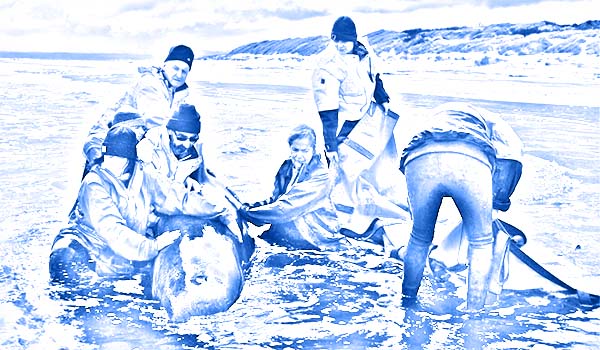Rescuers save 108 whales in Australia’s biggest mass stranding

Rescuers work to save a whale on a beach in Macquarie Harbour on September 25, 2020. Photo: AFP. Sketched by the Pan Pacific Agency.
CANBERRA, Sep 26, 2020, SCMP. Rescuers on Saturday confirmed they saved a total of 108 long-finned pilot whales involved in Australia‘s largest mass stranding on Tasmania’s west coast. Rescuers said there were no more live whales in the harbour, after an estimated 470 whales became stranded this week, South China Morning Post reported.
Authorities have revised the number of dead whales down to 350.
Marine Conservation Programme biologist Kris Carlyon said on Saturday only one whale had restranded itself on Friday night, which was considered a success given 20 were rescued that day.
On Monday, around 270 whales were discovered at three sites in Macquarie Harbour. One-third were already dead before rescue efforts could begin.
A further 200 dead whales were spotted on Wednesday morning some 7-10km from the original site.
Efforts have begun to move the hundreds of carcasses out to deeper water using barges or towed by boats, which could take several days and relies on smooth conditions.
Authorities are experimenting with burying the dead whales at sea.
Pilot whales are known for stranding in mass groups. The top five largest beachings in Tasmania, dating to the early 1800s, all are from the same species.
The reason for the country’s biggest mass whale stranding will probably remain a mystery, a marine mammal specialist said, but the social nature of the species involved may have played a part.
David Hocking, a marine mammal scientist at Monash University in Melbourne, said pilot whales formed strong family bonds and could travel in groups of up to 1,000.
“If one or a few animals get themselves into trouble, they put out a distress call,” Hocking said on Saturday. “Rather than running away, their instinct is to come together as a group because they have safety in numbers. But that means a few animals getting into trouble means they call more animals into that same area.”
Long-finned pilot whales are more closely related to dolphins and rely on echolocation, a series of rebounding clicks, to navigate.
Australia’s largest mass stranding had previously been 320 pilot whales near the Western Australia state town of Dunsborough in 1996. Tasmania’s previous largest stranding involved 294 whales on the northwest coast in 1935.